Misinformation: Down the rabbit hole, and back
A month since the fiery end to the Wellington occupation, misinformation that helped fuel it is still alive and well in Kiwi communities. Alongside anti-vaccine beliefs, popular theories at the protest camp included the threat of a second Nuremberg trial, claims the Prime Minister’s fiancé is in jail and – for some – the belief Covid-19 isn’t real at all.
So how do Kiwis fall down the rabbit hole, and how do they get out? In the first of a three-part series on 1News.co.nz and 1News at 6pm, Kristin Hall spoke to some who’ve been there. Some names have been changed to protect their privacy.
Sarah
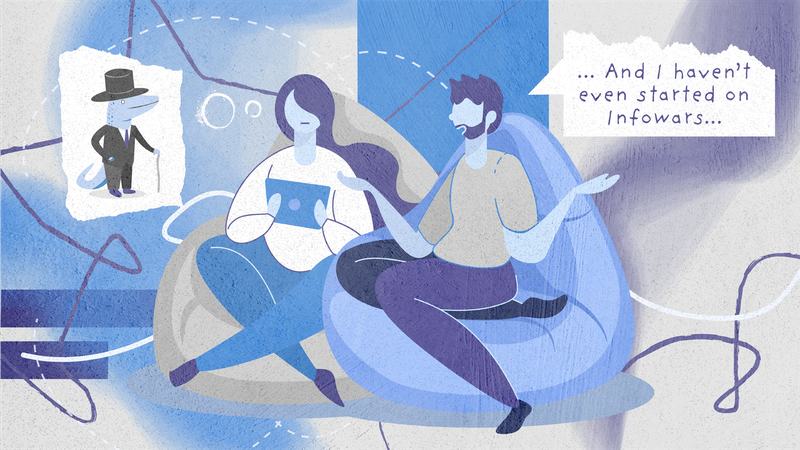
For Sarah, her descent started with a friend.
ADVERTISEMENT
“I met [him] through a very random group of people… he was heavily into conspiracy theories, he was watching a lot of David Icke and Alex Jones and whatever else he could find, ancient aliens and that kind of thing. I was not in a great place mentally at the time so I kind of fell for it, I guess.”
Sarah has had a difficult life, struggling with mental and physical illness, loneliness and poverty. She says listening – and believing – gave her a sense of belonging.
“He believed that fluoride in the water was bad, he believed in… lizard people, he believed in anti-vax stuff… I don’t know if it made any sense to me at the time, it was something that I could relate to with another group of people… I was so lonely.”
Watching YouTube was a ritual for the pair, particularly the videos of UK-based Icke, a former footballer who claims the world is controlled by a “predator race” of lizards disguised as humans, and Jones, a prominent American conspiracy theorist who’s currently dealing with multiple lawsuits, having lost several defamation cases over his claims the Sandy Hook school shooting was faked.
“One of the allures of getting into conspiracy theories is the way these presenters speak. They are very confident, you get drawn in by what they say… the way they speak doesn’t make you question.”
Sarah’s foray into the world of conspiracies didn’t help her ailing mental health. She says her friend downgraded to a basic model phone after becoming convinced the Government was tracking him, and that worry began to rub off on her.
“It made me very scared and very paranoid and made me think the Government or some other entity was coming after me, not necessarily an alien but that… someone dangerous was coming after me.
ADVERTISEMENT
“I just got lost in it. I didn’t really know what was going on, my mind was jumbled because of all the trauma…the life circumstances that got me to where I was at the time. It wasn’t a good way of living and I didn’t enjoy it”.
Desi
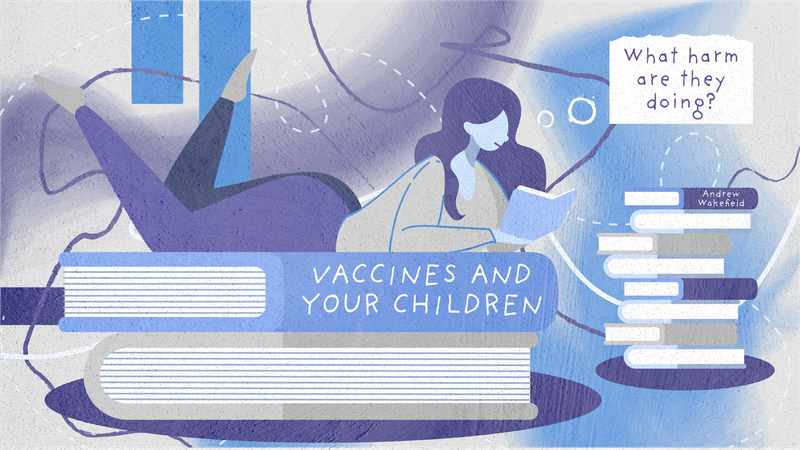
Desi’s introduction to misinformation also started with a group of friends, though it happened well before the internet was part of people’s daily lives. A passionate advocate for breastfeeding, Desi was part of the La Leche League while living in South Africa, and her local chapter happened to be vocally anti-vaccine.
“It was a good community of mothers, but the group I was in was ardently anti-vax and I got sucked in because it was a nice community and it was all-encompassing.”
She says the club had a small library, and it was there that she learned about Andrew Wakefield. In 1998 the British doctor led a now retracted study that linked the measles, mumps and rubella (MMR) vaccine with autism and gastrointestinal issues.
The study was based on case reports of just 12 children, a tiny sample size. It cherry-picked and falsified evidence according to the parents of the children involved, and was later found to have been financially motivated. Patients were recruited through anti-MMR campaigners, and Wakefield was paid by a personal injury lawyer who represented the several of the patients.
ADVERTISEMENT
The study was also found to have put child patients through “invasive” and “unnecessary” medical procedures. This wouldn’t be fully revealed for many more years.
Wakefield’s paper in the Lancet was formally retracted in 2010 and he was struck off the British medical register that same year. In the late ’90s and early 2000s though, Wakefield was the darling of the global anti-vax movement.
“I believed so strongly in this because The Lancet published this thing by Andrew Wakefield, and if it’s a medical journal of course you’re going to believe them” Desi says.
She says the mothers’ group was kind and welcoming, and they loved their kids – making what they said easier to swallow.
“I think when you’re a mum you want the best for your children, and a when lovely person is telling you the best thing for your children is not vaccinating them, you go along with that.”
Did anyone outside of the group question her?
“I think I was so forceful in my beliefs nobody who disagreed with me dared raise their head above the gunnels.”
ADVERTISEMENT
Alison
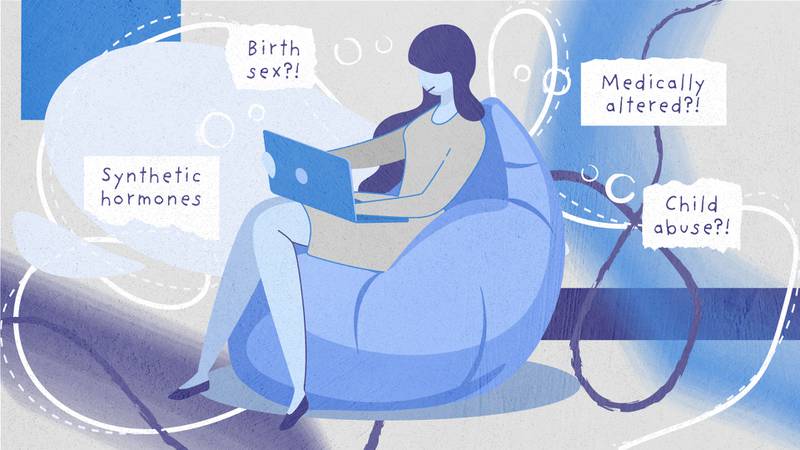
Like Desi, motherhood had a part to play in Alison’s story too.
When her stepson came out as transgender and was prescribed puberty-blocking medication, she felt she had no one to talk to about it – so turned to the internet.
“If you type in ‘are puberty blockers dangerous?’ then you can be sure you will start entering some very dark territory,” Alison says.
She landed on a blog for parents that advocate against young people transitioning, and the arguments drew her in.
“[There were] medical papers that of course I couldn’t make sense of, but they were featured on someone’s blog who provided it as proof that puberty blockers were dangerous.”
ADVERTISEMENT
“It seemed like, yes, here are the answers I needed. The excitement of seeing a community of people like me concerned about the growth of transgender teens raised my anxieties, and obviously my relationship with my stepson’s father – my partner – deteriorated. Why was he being so complacent? Why isn’t he asking questions?”
Though there has been controversy surrounding the use of puberty blockers overseas, they are legal in New Zealand. The Mayo Clinic says the benefits of puberty blockers for children who have gender dysphoria include improvement in mental wellbeing (including reducing thoughts or actions related to self-harm), improved social interactions and eliminating the need for future surgeries.
But Alison says that information wasn’t in the blogs she was reading.
“I found myself going even crazier, terribly anxious, terribly worried about my stepson. Was he a lesbian who was homophobic? Were the medical campaigners who were saying puberty blockers were dangerous being silenced, as was claimed? Were the numbers of de-transitioners being hidden? So many questions with no one to talk to about it. It was an awful time.”
Steve
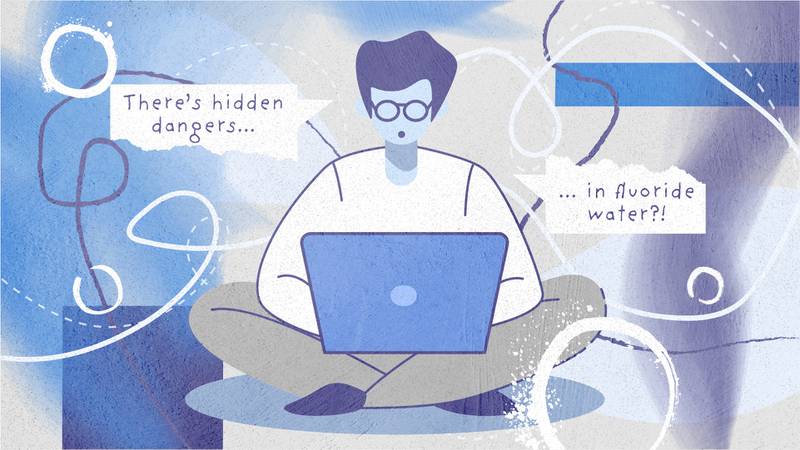
The internet also played an integral role in Steve’s experience with misinformation, a period he still feels embarrassed and anxious about.
ADVERTISEMENT
“Looking back, I’m really surprised and disappointed in myself that I could make that mistake,” he says.
Steve was part of the anti-fluoride movement between 2013 and 2015, after watching a video of a dentist he respected draw a link between fluoride and cancer.
“He appeared nice, genuine, concerned and had old-school ethics… this was the trap I fell for,” Steve says.
But it didn’t stop at one video.
“My phone kept sending me more and more and more videos of scientists who shared his opinion, some had even been fired… so from an emotional perspective I felt like there had been an injustice.”
Steve followed the fluoride debate involving his local council closely, and says media derision of the group arguing against fluoride at the time cemented his opinion. He spent many evenings researching the topic, often coming across information that reinforced his suspicions.
“I wasn’t able to interpret the evidence for what it actually meant, and even if I did come across science that showed efficacy and safety [of fluoride], I wasn’t able to disassociate my heart from the evidence. I was really into this though – I spent a good hour each night reading up and ultimately confirming my suspicions.
ADVERTISEMENT
“The social media algorithms are just unbelievable… Once you’re in that rabbit hole it’s got steep sides, it’s very difficult coming out of it.”
A real expert’s view of misinformation
So how do we help people out? The answer may lie in looking at those most vulnerable to misinformation.
Psychotherapist Paul Wilson says there are four consistent factors.
“The first one would be a sense of being alienated or marginalised, and that can be because they have legitimate experiences of sexism or racism or poverty that leads them to feel that they aren’t as part of the world or important enough as others are,” Wilson says.
“The second thing that’s really common is a sense of dissatisfaction with their status in life, how things are panning out for them, or life feels mundane or boring or they aren’t really fulfilling their potential, so they feel frustrated.
“Also, there are often – but not always – kind of an unconventional world view… they might have magical thinking or… paranormal beliefs which makes them a little bit outside the mainstream in terms of the way they look at the world.
ADVERTISEMENT
“And then the big factor actually is a sense of powerlessness that their life isn’t the way they really want it to be, and they feel thwarted and there’s nothing they can do about it because the system seems set up to hold them down.”
He says conspiracies and misinformation campaigns are attractive because they simplify complex problems – turning things like war and disease into a battle of good versus evil.
“The world actually makes sense to you… it’s not this complicated, unpredictable thing where everything feels uncertain, you don’t know what’s going on – actually no, you do know what’s going on, you know why the world is the way it is, why war and poverty and natural disasters and terrorist attacks happen, and that it becomes predictable and manageable.
“You can just organise and join in with a group and start fighting against this group that you’ve identified… the forces of light and the forces of darkness, and you’re one of the good guys.”
Getting out
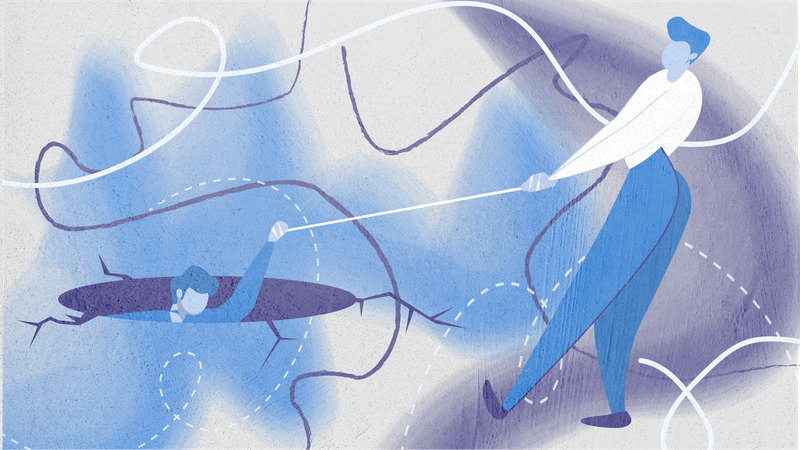
Sarah says she dragged herself out partly by breaking off the relationship with her friend.
ADVERTISEMENT
“One time I did try to watch a David Icke video by myself instead of having my friend with me, about 10 minutes in I was like, this guy is f***ing insane,” she laughs.
“I kind of just didn’t go back – we weren’t hanging out, I didn’t have his influence on me anymore and trying to watch them myself, even though I was kind of into conspiracy theories at the time, I was like, this doesn’t make any sense.”
Life still isn’t easy for Sarah, but she says things like therapy have helped.
“I’m not constantly paranoid anymore, I don’t think the Government is after me for no reason. I feel like my thought process is more logical now… and just less scared in general. I’m scared because of climate change and capitalism, but I’m not scared of made-up stuff that doesn’t exist.
“I want to say ‘do your research’ but for a lot of people who are in it, their research is memes. If you’re questioning the rhetoric that is being advertised to you, find scholarly articles if you’re good at reading, find videos that link their sources, listen to the actual experts. Find peer-reviewed studies and things that will help you find the real truth… there are no microchips in your vaccines.”
‘Lightbulb moment’
For Desi, there was a “lightbulb moment” – not only did Wakefield’s credibility crumble, but there was other information she was reading that didn’t sit well.
ADVERTISEMENT
“I was reading the account of a mother who had five children who all got measles one after the other, and she was very proudly recounting how through natural means she nursed them and didn’t get enough sleep for five months. That was the lightbulb moment. I thought, ‘Lady, that’s child abuse,’ and… that sort of hardened me. I felt terrible that I’d compromised my children’s health for faulty facts and faulty logic.”
Desi says two of her children are now nurses, and one works as a vaccinator. She feels guilty about her years of anti-vax beliefs, but is relieved to be out.
“The feeling of relief when I came out of the rabbit hole was… finally not having to live up to the expectations of what other people expected me to believe… I felt far more true to myself.”
She says the solution for getting through to friends or family members sucked in by misinformation is “lots of cups of tea and lots of chats”.
“Giving them advice of who to talk to, what to read, I also think pointing out the whole foundations of conspiracy theories, the logical fallacy and all those things, that helped me a lot… thinking, ‘oh well, this is how I got into this faulty thinking/misinformation stage’, it’s because these things weren’t addressed.’”
‘Chilling’
Alison’s breakthrough came thanks to a combination of factors. Her online research led her to articles on Breitbart – a far-right American news outlet that has spread misinformation about climate change, immigration and voter fraud, to name a few.
ADVERTISEMENT
“Realising that many of the arguments presented… were in fact driven by a white, religious, conservative agenda was chilling. They go for the emotions, the insecurities and the idea of being a bad parent. It goes straight to the jugular.”
Speaking to an old friend also helped, and realising her stepson’s life had improved since he started the puberty blocking medication.
“[My friend] really snapped me out of it… just saying, ‘Back off, your child knows if they’re trans.’
“My step-son had started to show more joy in his life, was leaving his room more, was less anxious since he had been on puberty blockers. Puberty blockers enabled him to go to school.”
Fallacies
It took Steve two years to distance himself fully from the anti-fluoride movement, thanks to help from trusted people in his life.
“I asked my doctor, who I trusted but I felt he wasn’t aware of the ‘story’ behind fluoride. I asked my dentist, who basically laughed his ass off at me.
ADVERTISEMENT
“I also had a friend who was not a scientist but had a pretty good understanding of it, and he helped me understand what some of the data and studies meant and some of the things to look out for, such as appeals to conspiracy, and some of the fallacies people use to attract others to their conspiracy. Initially I felt this was a bit condescending, but I did start to notice patterns and I see the same patterns today in the anti-vax stuff.”
He’d love to see more myth-busting content from scientists and media to help combat the tsunami of misinformation at people’s fingertips.
“Everything on social media is basically there to convince you of something, it lacks evidence and many YouTube channels go out of their way to tell lies… or put it across in a way that glosses over the important bits, so you lose the important context.
“We need more science communicators that are more relatable and engaging… that can attack a premise without attacking a person. Many people tend to attack the person first, it polarises people too early… you’re attacking someone’s hero.”
‘It’s not easy’
Wilson says it is possible to lift people out of the rabbit hole, but it requires time and patience.
“It’s not easy. For a start, we’re not easily persuaded by people who we feel look down on us or dislike us or hate us, so if it’s someone who’s close to you who’s gone down the rabbit hole, it’s not some rational intellectual debate where you can just tell them where they’re wrong and it’ll all be sorted out – it’s much more complicated than that.
ADVERTISEMENT
“It’s a very emotional process for the person who believes in the conspiracy theory and if it’s someone close to you, it starts to become a really emotional process… Maybe they’re saying that you’re foolish or stupid because you’ve been duped, that causes feelings of shame and disconnection for you and so you’re now grieving, like you’re grieving the loss of the person you thought you knew.”
As tempting as it might be to argue with whanau or friends who believe in conspiracies, it may not be successful.
“It’s all in the tone, when you talk to them… if you can be curious, ask them questions, try and get a sense of like what it is about the conspiracies that attracts them, what resonates with them about it which might start getting them talking about their own history, and that’s actually a real human-to-human connection.
“Don’t cause them more emotional pain or play gotcha, or imply that they’re stupid or crazy, because it really just pushes them further away.”
Wilson says it’s important to remember those ‘down the rabbit hole’ may not be there forever.
“A feeling of fear or of not mattering to people or of not belonging, all of those things are human struggles that all of us to a certain extent can relate to. So I think they can be reached, we just have to try.”


